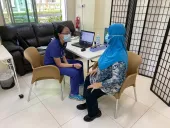
Three in five people hit by health exclusivity
More than 60% said they faced at least one barrier in accessing healthcare.
More than three in five people globally suffer from health exclusion, with the most vulnerable and younger population taking the most hit, a survey from Economist Impact backed by Haleon showed.
The study also indicated that 66% experienced at least one barrier in accessing healthcare services. This ranges from lack of available appointments and distance and cost of travel. It also revealed that one in five people worldwide (20%) lack access to mental health services in their community, while 17% lack access to sexual health services.
The study also suggests younger generations face issues, with almost half of Gen Z (45%) stating their quality of care has been compromised as a result of their age, health status, or other personal factors, compared with 19% of Baby Boomers.
However, almost a third of Gen Z (28%) and Millennials (32%) report that their pain or health conditions are not taken seriously by healthcare professionals. Whilst almost a quarter of Gen Z (21%) and Millennials (22%) report they were denied access to healthcare, compared with just 8% of Baby Boomers.
Gen Z are the most likely to cite a lack of trust in healthcare providers and fear of discrimination as major obstacles when seeking healthcare services. Over 44% of Gen Z also cited social media as a trusted source of health information and advice – the highest proportion amongst all generations surveyed.
"The most vulnerable populations, namely people from marginalised groups and those with chronic health conditions, also report being denied access to healthcare (26%). Discrimination is a key barrier, with more than a quarter (27%) of those from marginalised groups and people with chronic health conditions experiencing this when interacting with healthcare providers," read the study.
The research evaluated the "extent and experience of health inclusion across 40 countries and 42,000 people."













 Advertise
Advertise













